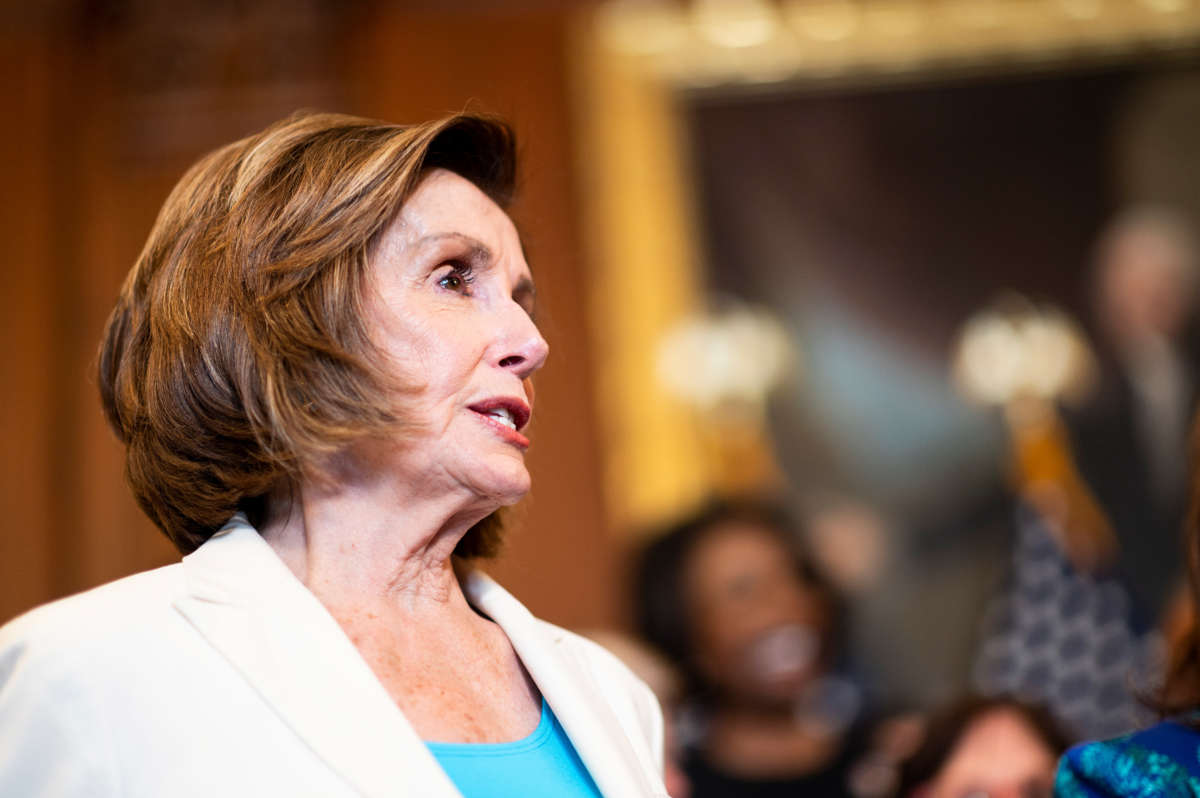Speaker of the House Nancy Pelosi announced on Thursday that the commission set to investigate what led up to the attack on the United States Capitol building on January 6 would move forward, with or without the cooperation of House Minority Leader Kevin McCarthy.
Pelosi described the investigation into the attack on the Capitol building, which occurred following weeks of former President Donald Trump making false claims that there was fraud involved in the 2020 election, as “deadly serious” work. Trump told his loyalists to go directly to the Capitol in a rally preceding the attack on January 6.
But McCarthy has threatened to not take part in the investigation process. Per the rules established in the formation of the commission, McCarthy is allowed to name five members to serve on the committee, with consultation and approval from Pelosi. Among the five members McCarthy named, Pelosi rejected two of them, Reps. Jim Jordan and Jim Banks — two staunch supporters of former President Donald Trump who voted against certifying the 2020 presidential race on the same day as the Capitol attack, one of whom has wrongly suggested that Pelosi herself was responsible for the violence on January 6.
In response to the speaker rejecting two of his picks, McCarthy withdrew the remaining three members he had chosen (who Pelosi had accepted) out of protest, calling her decision an “egregious abuse of power.” He also threatened to remove himself and Republicans from the process altogether, unless Pelosi acquiesces to letting those picks serve on the commission.
The speaker defended her choice to remove the two Republicans.
Jordan and Banks, Pelosi explained to reporters on Thursday, “had made statements and taken actions that I think would impact the integrity of the Committee, the work of the Committee.”
Pelosi further explained, “It’s about our Constitution, our country. It’s about an assault on the Capitol that’s being mischaracterized for some reason at the expense, at the expense of finding the truth for the American people.”
The speaker affirmed that Republican opposition would not prevent her from moving the commission forward.
“It is my responsibility as the speaker of the House to make sure we get to the truth of this,” Pelosi added, “and we will not let their antics stand in the way of that.”
Pelosi has the power to add more Republican members to the committee if the Minority Leader chooses not to take part. Some Democrats say that doing so may give the commission more weight and an appearance of bipartisanship when it makes its final findings.
Most voters in the U.S. seem to agree on the need to form a commission. A recent CBS News/YouGov poll published this week shows that 72 percent of Americans believe there is more to be learned about when it comes to how the attacks transpired on January 6. Just 28 percent disagree, saying we already know all there is to know about the attacks.
Republicans’ reticence to examine the Capitol attack may be linked to the fact that most Americans also believe that they and Trump were both at least partially responsible for what transpired. A Morning Consult poll from late June found that 61 percent of Americans believed Trump was responsible for the events on January 6, while 50 percent of respondents in the poll said Republicans were also responsible.
We’re not backing down in the face of Trump’s threats.
As Donald Trump is inaugurated a second time, independent media organizations are faced with urgent mandates: Tell the truth more loudly than ever before. Do that work even as our standard modes of distribution (such as social media platforms) are being manipulated and curtailed by forces of fascist repression and ruthless capitalism. Do that work even as journalism and journalists face targeted attacks, including from the government itself. And do that work in community, never forgetting that we’re not shouting into a faceless void – we’re reaching out to real people amid a life-threatening political climate.
Our task is formidable, and it requires us to ground ourselves in our principles, remind ourselves of our utility, dig in and commit.
As a dizzying number of corporate news organizations – either through need or greed – rush to implement new ways to further monetize their content, and others acquiesce to Trump’s wishes, now is a time for movement media-makers to double down on community-first models.
At Truthout, we are reaffirming our commitments on this front: We won’t run ads or have a paywall because we believe that everyone should have access to information, and that access should exist without barriers and free of distractions from craven corporate interests. We recognize the implications for democracy when information-seekers click a link only to find the article trapped behind a paywall or buried on a page with dozens of invasive ads. The laws of capitalism dictate an unending increase in monetization, and much of the media simply follows those laws. Truthout and many of our peers are dedicating ourselves to following other paths – a commitment which feels vital in a moment when corporations are evermore overtly embedded in government.
Over 80 percent of Truthout‘s funding comes from small individual donations from our community of readers, and the remaining 20 percent comes from a handful of social justice-oriented foundations. Over a third of our total budget is supported by recurring monthly donors, many of whom give because they want to help us keep Truthout barrier-free for everyone.
You can help by giving today. Whether you can make a small monthly donation or a larger gift, Truthout only works with your support.
